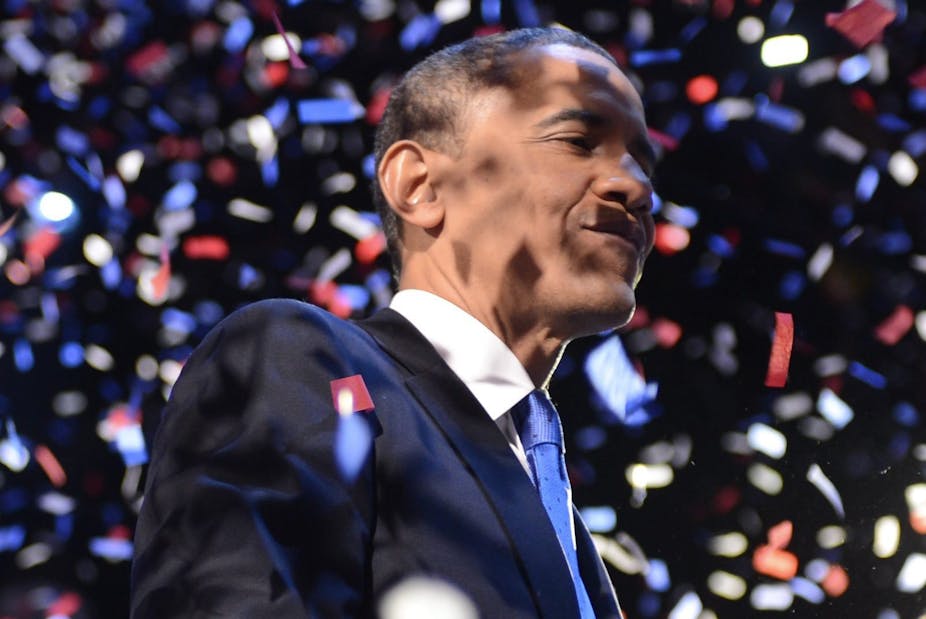After an expensive, unenlightening, and interminable campaign, Barack Obama overcame a weak economy, high unemployment, and a lacklustre performance in his first debate with Mitt Romney, and was re-elected as President of the United States.
Although his margin of victory was smaller than in 2008, it was substantial. He garnered 303 electoral votes (excluding Florida, which, at the time of writing, remains a toss-up) and about a 2% advantage in the popular vote.
Obama won by building on the coalition he knitted together in 2008. About 45% of his supporters were not white. Almost all African-Americans who cast ballots supported him. Latinos, who now constitute 9% of eligible voters in the United States, chose him over Romney by about two to one.
Less enthusiastic than four years ago, young people nonetheless turned out for the president. And women, who comprise about 54% of the electorate, contributed to what may well be the biggest gender gap in the history of American elections.
Mitt Romney turned out to be a weak, gaffe-prone opponent, relying principally on vague “he had his chance, let’s try someone else” arguments. Appealing to the right-wing base of the Republican Party during the primaries, Governor Romney took positions that came back to haunt him. He advocated massive tax cuts for wealthy Americans; supported “self-deportation” for illegal immigrants, most of whom are Latinos; opposed the federal government bailout of the automobile industry, a popular policy in the “must win” state of Ohio. He endorsed an agenda that would roll back reproductive rights for women, and chose a hard line, anti-abortion zealot as his running-mate. Romney moved to the middle in October, but it was too little and too late.
By all accounts, the president’s handling of Hurricane Sandy, which devastated parts of New York, New Jersey, and Connecticut a few days before the election, helped him consolidate and extend the microscopic lead in battleground states he had re-established following his performance in the second and third debates.
Americans gave him high marks for leadership. When Chris Christie, the governor of New Jersey – and keynote speaker at the Republican presidential convention – lavished praise on the president, he gained credibility as well as a politician who could cross party lines to get things done. And some voters noticed that Governor Romney had advocated returning responsibility for natural disasters to the states or privatising the Federal Emergency Management Administration (FEMA).
Even before he takes the oath of office in January, President Obama will have to work with the House of Representatives and the Senate (whose composition was virtually unchanged by the election) to keep the United States from falling over “the fiscal cliff.”
Unless Congress acts quickly, across the board cuts to defence and domestic appropriations will be implemented in 2013, a result of the automatic sequestration provisions of the Budget Control Act of 2011, which will be triggered if $1.2 trillion is not cut from the federal budget. These cuts, most economists agree, will result in a spike in unemployment and push the United States into recession.
Republicans may well feel greater pressure to compromise on a package that includes tax increases and reductions in expenditures. If a “grand bargain” is not struck, the stock market will, in all likelihood, take a nose dive. And the president will blame the Republicans for putting politics ahead of the welfare of the nation. He will do so as well, in 2013, if Congress fails to pass comprehensive immigration reform.
The GOP is likely to take stock in the wake of Romney’s defeat. No doubt, some Tea Party members will claim that a “real” conservative, like Paul Ryan, would have won the election. More moderate Republicans (for example Jeb Bush, the former governor of Florida) are sure to counter by insisting that party leaders take note of demographic trends.
In the first decade of the new millennium, according to the U.S. Census Bureau, the African-American population rose 12.3%, the Latino community grew by 43%, and whites increased by only 5.7%. If Republicans fail to reach beyond white males, evangelical Christians and senior citizens and the GOP remains “the party of no”, it will remain a permanent minority party for many elections to come.
For the Democrats, the passage of the Affordable Health Care Act marks the completion of the New Deal agenda. Buoyed, perhaps, by an economic recovery (that could produce 12 million jobs during Obama’s second term), the president may be able to draw on a reservoir of public support for his policies.
But, alas, it is quite possible that even he does not know what they will be.

